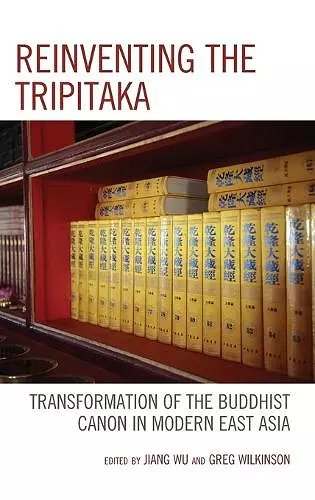Reinventing the Tripitaka
Transformation of the Buddhist Canon in Modern East Asia
Greg Wilkinson editor Jiang Wu editor
Format:Hardback
Publisher:Lexington Books
Published:20th Sep '17
Currently unavailable, and unfortunately no date known when it will be back

The Chinese Buddhist canon is a systematic collection of all translated Buddhist scriptures and related literatures created in East Asia and has been regarded as one of the “three treasures” in Buddhist communities. Despite its undisputed importance in the history of Buddhism, research on this huge collection has remained largely the province of Buddhologists focusing on textual and bibliographical studies. We thus aim to initiate methodological innovations to study the transformation of the canon by situating it in its modern context, characterized by intricate interactions between East and West as well as among countries in East Asia. During the modern period the Chinese Buddhist canon has been translated, edited, digitized, and condensed as well as internationalized, contested, and ritualized. The well-known accomplishment of this modern transformation is the compilation of the Taisho Canon during the 1920s. It has become a source of both doctrinal orthodoxy as well as creativity and its significance has greatly increased as Buddhist scholarship and devotionalism has utilized the canon for various ends. However, it is still unclear what led to the creation of the modern editions of the Buddhist canon in East Asia. This volume explores the most significant and interesting developments regarding the Chinese Buddhist canon in modern East Asia including canon formation, textual studies, historical analyses, religious studies, ritual invention, and digital research tools and methods.
This collection goes well beyond the usual paleographical, philological, and redaction historical preoccupations of canonical scholarship to shed light on the life of the Buddhist canon in the wider world. These well-researched and highly readable studies show how the Buddhist scriptures function in the realms of politics, missions, nationalism, devotional practices, international relations, scholarship, and technology. This will be an indispensable addition to any collection of studies on Buddhist literary culture. -- Charles B. Jones, The Catholic University of America
Reinventing the Tripitaka: Transformation of the Buddhist Canon in Modern East Asia opens a new chapter in the study of East Asian Buddhism, focusing on the use of the Chinese Buddhist canon as an agent in constructing a modern framework for the study of Buddhism in the face of Western cultural, intellectual, and religious dominance. It is an excellent contribution to our knowledge and is highly recommended for those interested in the modern political and religious history of East Asia, digital humanities, bibliographic studies and the history of the book in East Asia. -- Albert Welter, University of Arizona
The Buddhist Canon translated from South Asian languages into Chinese constituted a staggering achievement in intercultural communication fifty times the size of the Bible, so transferring this vast mass of text into modern typeset and digital formats raises acute questions of cultural identity as well as technology. The essays on the topic collected here therefore open up some urgent contemporary issues in exciting new ways—well done! -- Timothy Barrett, University of London
The contemporary study of the history of Buddhist canons in East Asia has emerged in recent years as an important part of cultural as well as religious approaches. In this volume, we find an excellent summation of scholarly efforts that have been directed toward textual research in the field. The appraisal of the impact of digital and information technology is a welcome interpretation of present methodology in Buddhist studies. -- Lewis Lancaster, Emeritus, University of California, Berkeley
ISBN: 9781498547574
Dimensions: 235mm x 161mm x 21mm
Weight: 522g
268 pages